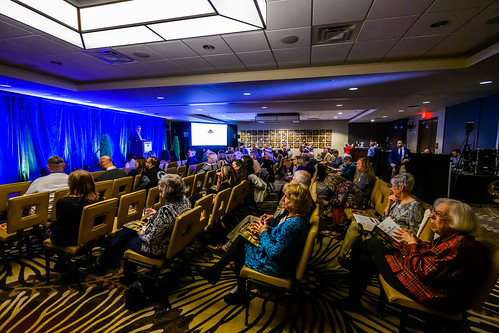Receiving a grant from Berks County Community Foundation marks an exciting milestone in your organization’s journey. It’s more than just funding – it’s a boost of confidence in your vision and the impact you make in our community. Let’s walk through what happens next and how to make the most of this opportunity.
First Things First: The Grant Agreement
Before the fund is distributed, there’s one crucial step that must be taken: completing your grant agreement form. This document outlines the responsibilities between your organization and the Community Foundation, ensuring clarity and setting expectations. You’ll need to submit this through our third-party online portal within 30 days of receiving your email offer.
Sharing Your Success
Once your grant agreement is squared away, consider sharing your achievement with the community. Here’s how to do it effectively:
- Celebrate Your Team
Take a moment to acknowledge the dedication and hard work that brought you here. Your team’s commitment deserves recognition, and this grant validates their efforts.
- Tell Your Story
Consider sharing your journey and plans across your communication channels. Whether that is through your website, social media, or newsletter, let your supporters know about this exciting program. It’s about inspiring others and showing the positive changes happening in our community.
- Give Credit Where Credit is Due
When sharing news about your grant, please include proper acknowledgment of the funding source. Use the following format:
“Support for this project was provided by the [XYZ Fund] of Berks County Community Foundation.”
Click here to download a comprehensive resource to help you navigate this journey. Click here to find detailed guidelines for using our organization’s name and logo, templates for various communications and more!
- Looking Ahead
This grant is just the beginning. We’re excited to see how your project develops and the positive change it brings to our community. Remember, our team is here to support your success every step of the way.
Have specific questions about promoting your funding? Email me at ericac@bccf.org.
The Building Industries Exchange of Reading and Berks County Fund supports the construction or renovation of facilities owned by or for charitable organizations in Berks County. To be considered for funding, organizations must fill out a Letter of Intent (LOI) form. LOIs will typically be reviewed within 14 days of submission. If the project meets the fund’s mission, the Community Foundation will invite the organization to submit an official application.
LOIs and applications are accepted on a rolling basis when funding is available. There is currently $65,000 in funding available, with grants typically ranging from $10,000 to $25,000. Before starting an LOI, organizations should review the Community Foundation’s grantee standards on the website.
Since this fund was established in 2013, nearly $300,000 has been awarded to 48 organizations and individuals in Berks County.
The construction and building industries are essential to economic development and community well-being. With advancements in sustainable building practices, energy efficiency, and modern construction techniques, the industry is evolving rapidly.
To learn more about the Building Industries Exchange of Reading and Berks County Fund visit: https://bccf.org/funds/building-industries-exchange-of-reading-and-berks-county-fund-2/.
The Building Industries Exchange of Reading and Berks County Fund is one of the many funds managed by Emily Smedley, our Environment and Energy Program Officer. Emily leads initiatives supporting environmental health, sustainable energy, and community vitality in Berks County. To learn more about Emily’s role, click the video below.
Each year, our scholarship application opens on January 1st and must be submitted by 11:59 PM on March 1st. Please note that applications may not be edited or submitted after the deadline. To ensure a fair process, we are unable to make exceptions to the deadline.
These scholarships are open to students from all high schools across Berks County and of all ages. Want some inspiration? Read our blog, “Embracing a New Chapter: A Retiree’s Journey Back to School”. Loretta Boyd received the Community General Hospital Foundation June A. Roedel Healthcare Scholarship, just one of the many scholarships for which you can apply.
To view a list of all of the scholarships we have to offer, click here.
Thanks to the incredible generosity of community members who established and contributed to scholarship funds since our founding, we awarded approximately $747,000 in scholarships in 2024!
If you have questions while completing your application, visit our FAQ section for helpful tips. You can also email us at scholarships@bccf.org or call 610.685.2223.
Our scholarships are managed by Kim Sheffer, Lifelong Learning Program Officer. Kim oversees 130 scholarship opportunities and education-related grants. With a decade of experience at the Reading Public Library in roles ranging from Children’s Library Assistant to Senior Outreach Coordinator, Kim has a deep understanding of our community needs. To learn more about Kim’s role, take a look at the video below!
In Fiscal Year 2024, Berks County Community Foundation distributed $5.4 million in grants and scholarships to support the community. The year was filled with innovative projects, impactful programs and a strong commitment to our mission.
Berks County Community Foundation helps donors fulfill their charitable desires. The Foundation was established in 1994 as a non-profit, public charity to provide a locally managed resource for establishing endowments. We have program officers on staff who are experts in their focus areas – energy & environment, lifelong learning, health & human services, the arts, and neighborhood & economic development. They steward these charitable funds to ensure that the grants and scholarships awarded from them are making an impact and fulfilling our donors’ wishes.
“The work we do isn’t only about working with donors to establish funds. Nor is it just about awarding grants and scholarships. The team at the Community Foundation convenes local leaders, research national and local trends, and chooses initiatives on which to focus so community conversations get moving and big ideas are discussed”, Kevin Murphy, president says.
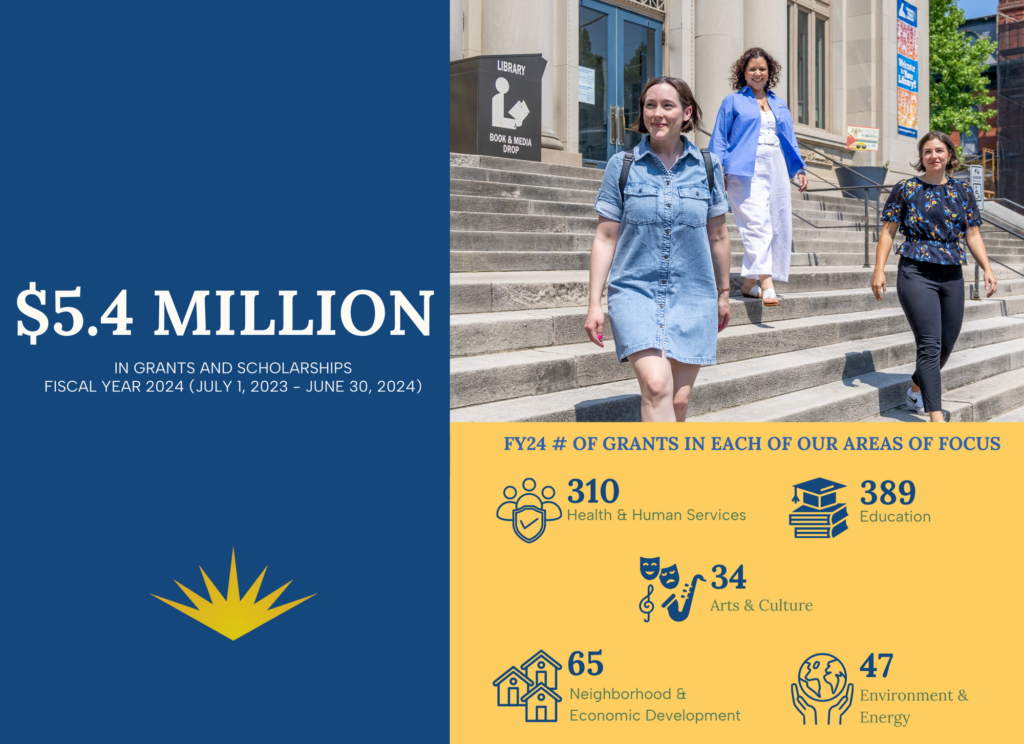
The Annual Report highlights our mission of promoting philanthropy and improving the quality of life for the residents of Berks County. The team works hard to bring organizations and individuals together for collaboration to spark change in the community. This year’s Annual Report provides detailed stories and data behind these achievements, underscoring the powerful impact of donor support in the community.
To read the full report, take a look below.
Exciting changes are on the horizon for the Reading Symphony Orchestra (RSO) as it welcomes a new executive director! This moment in the organization’s journey was celebrated on Thursday, September 19th at a welcome reception in our lobby at Third and Court. The event not only marked the beginning of a fresh chapter for the orchestra but also served as a networking opportunity for local leaders and community members.
Attendees included business leaders, philanthropists, and community advocates—all eager to connect and support the new executive director as he takes on this exciting journey.
The atmosphere was filled with the sound of laughter, lively conversation, and the buzz of possibility. Guests mingled, sharing their visions for the future of the RSO and exploring how they could collaborate to enrich the cultural fabric of Berks County. David brought Hershey’s Symphony Chocolate paired with two tickets to see the orchestra, doubling as a fun treat for guests.


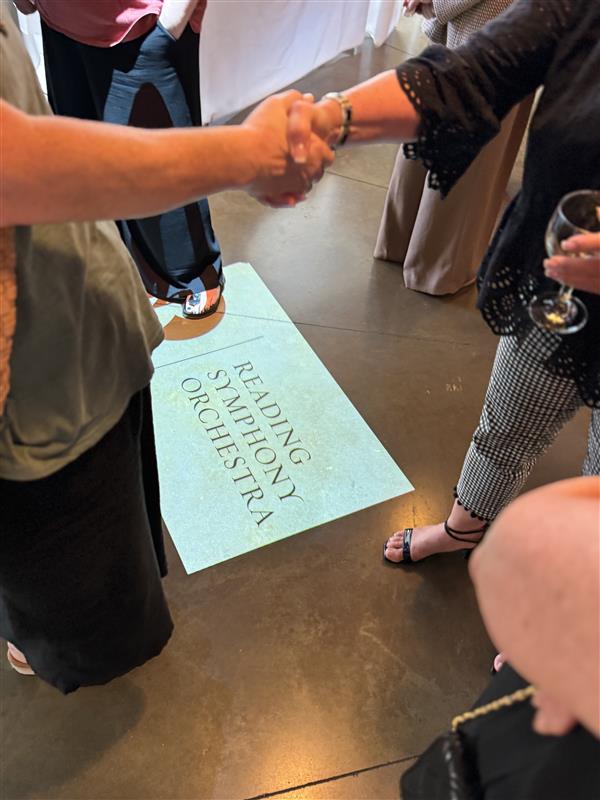
David says, “I am really grateful to be here at this time and to do this work with you. We are excited about the upcoming new season, and we hope it brings some air back into the arts because the arts are vital to the health and vitality of our community.”

Prior to David’s recent appointment, he served as president and CEO of ArtsinStark, a Stark County-wide arts council, in Canton, Ohio. Additionally, David served as the executive director for both the Asheville Symphony Orchestra in North Carolina and the Bangor Symphony Orchestra in Maine. During his time in Asheville, David developed and oversaw the implementation of several signature Asheville Symphony programs, including the Asheville Amadeus festival.
David also worked in Orange County, California, as an arts administrator with the Pacific Symphony, Laguna Beach Music Festival, and the Philharmonic Society. Read more about David’s bio originally published here.
If you couldn’t attend the welcome party, there are still plenty of ways to get involved with the Reading Symphony Orchestra. Whether through attending performances, volunteering, or becoming a member, your support is invaluable. Click here to learn more about RSO.
Here’s to a bright future for the Reading Symphony Orchestra, and to all the incredible opportunities that await in Berks County!
Congratulations! You’ve received a grant from Berks County Community Foundation. This is an acknowledgment of your project’s potential and a testament to your hard work. This is a significant milestone, and we are excited to support you on your journey. What comes next?
Before you receive the funding from us, you are required to submit a grant agreement form. This agreement details the responsibilities of Berks County Community Foundation and your organization (grantee). This form must be completed within 30 days of the date of the initial offer email. This form can be submitted through our online portal.
After successfully submitting your grant agreement form, you have the option to share your results with the community. If you decided that you’d like to share on your website or social platforms, be sure to take the time to celebrate, share your results, and acknowledge the funding source.
- Celebrate: Acknowledge the hard work of your team and the success of your project.
- Share Your Results: Publish your findings, results, or outcomes in relevant forums or media. This not only highlights your success but also serves as a valuable contribution to the field.
- Acknowledge the funding source: Berks County Community Foundation must be acknowledged as a funding source when promoting your project(s). Please mention both the name of the fund and our organization, in the following format: Support for this project was provided by the XYZ Fund of Berks County Community Foundation.
You can find more information about this by following our guide. You can download a copy of the guide by clicking here. There are guidelines on how to correctly write the name of our organization and use our logo. Click here to find templates and download our logo.
Receiving a grant is a great achievement and an excellent opportunity to make a significant impact in our community. By understanding the terms of your grant, effectively managing your project/program, and reporting on your progress, you set the stage for a successful outcome. We are here to support you every step of the way. Here’s to sparking positive change that your project is bound to bring!
If you would like more information on the specific funding you received, contact Erica Caceres, Communication Manager, at ericac@bccf.org.
In March 2023, the Berks County Commissioners released a study about public health in our community. The report had four recommendations on how Berks County can support a healthier community. Leading the conversation are T.J. Huckleberry and Dr. Michael Baxter. I sat down with the two and had questions for them about the report’s recommendations. Get ready for insightful answers from experts in their field.
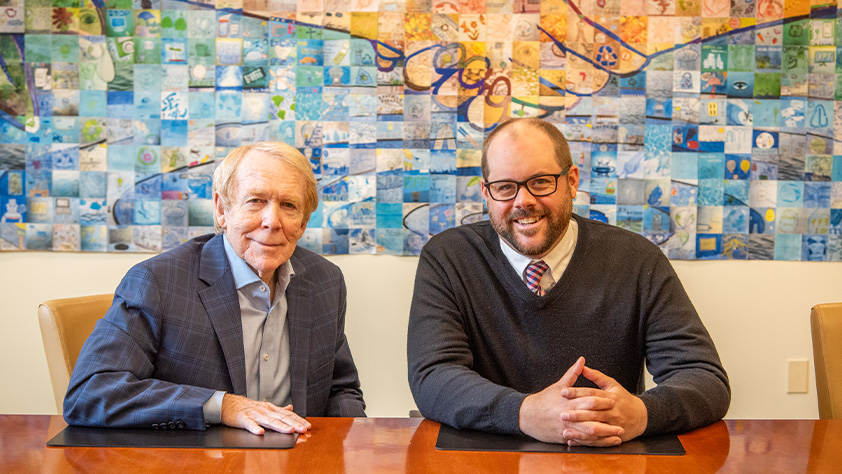
T.J. Huckleberry is the Executive Director of Berks County Medical Society. Berks County Medical Society serves members and the residents of Berks County, PA, with physician, hospital, and health-related information
Q: The commissioners released a report that provided four recommendations on how to create a healthier Berks County. What were your initial reactions to the report?
T.J.: This is the first tangible approach our county leadership has made towards addressing public health and wellness. It’s a great first step!
Dr. Baxter: The authors, Health Management Associates (HMA) of Philadelphia, did outstanding work reviewing the health problems and needs of Berks County. Their review and comparison of major health issues confronting Berks and five neighboring counties as well as comparing Berks with Pennsylvania and U.S. data was particularly enlightening.
Four recommendations:
1. Create a Berks County Health Director position to lead public health collective action and coordination and serve as a trusted communicator about public health information.
2. Establish a Public Health Advisory Panel and appoint members who can advise on public health assessment, assurance, and policy activities.
3. Support the establishment of a “Healthy Berks” coalition to serve as a coordinating body for public health efforts in the county.
4. Create a Berks County Health Data Analyst position to improve Berks County-specific public health data completeness and accuracy
Q: Why do you think it is important to educate the community on the report and its recommendations?
T.J.: These four pillars provide a blueprint for how we as a community can address and take control of our public health issues.
Q: If you had a magic wand, what are the top three wishes you would fulfill for Berks County to make it healthier?
Dr. Baxter: If I had to only choose three, I would like to see:
- Improved access to care for everyone with or without health insurance by increasing the numbers of primary care and mental health providers in Berks (in the HMA study, Berks was at the bottom of the number of such health providers per population).
- Healthier living for all (especially those with chronic diseases) by developing resources in the community for healthier diets and more easily accessed exercise and provider access.
- Proven efforts to address drug abuse and violence (especially guns) which have a devastating impact, especially on many young people.
T.J.: In addition to what Dr. Baxter mentioned, I’d also like to see increased avenues for mental health awareness and services.
Q: What initiatives can be implemented to improve healthcare access for individuals in Berks County?
Dr. Baxter: Access for all health services is a top priority. Increase the number of primary care and mental health providers as previously noted, and implement approaches (involving our health care institutions, schools, and others) to make such access available and affordable. Explore school-based clinics as a high priority for the physical and mental health challenges, especially facing children and youth.
Q: In what ways can we address healthcare disparities among different communities within Berks County?
Dr. Baxter: One way we can address the disparity is to use the data available through this study and the Hospital Community Health Needs Assessments to address identified problems throughout the county. This would be a priority for a County Health Director and a County Health Data analyst.
Q: How can we promote preventive healthcare measures to ensure better health outcomes for all Berks County residents?
Dr. Baxter: Health disparities which include the Social Determinants of Health must be a priority for any successful efforts to improve the health/public health of all the people of Berks County. Resources need to be coordinated between health care institutions, educational and religious groups, and the media to shine light on issues, the people most in need and the resources to meet those needs.
Q: What collaborative efforts can be made to strengthen the healthcare infrastructure in Berks County?
Dr. Baxter: A top priority would be to see our major health care institutions truly work together to improve the health of our people, but I have been waiting over 30 years for that to happen. I would hope a County Health Director, if not the full impact of a County Health Department, could help achieve that. In addition, we have many excellent organizations including the United Way and the Berks Community Health Center that could join forces to address many of our health and social determinants issues.
Q: One of the county health report’s recommendations is to create a Berks County Health Director position. We were introduced to the functions and responsibilities of local health directors during the COVID-19 pandemic. When they aren’t addressing emergency public health issues, what are some of their day-to-day responsibilities?
Dr. Baxter: A County Health Director would collect and organize data (with the assistance of the Data Coordinator), set priorities based on needs, coordinate efforts, and energize support (including political advocacy) to get things done that make a true impact.
Q: How could the recommendations in the county’s report supplement the work of local hospitals and the community health center? How do they differ?
Dr. Baxter: Our local “not for profit” hospitals are required by law to conduct their Community Health Needs Assessments every 3 years. They take this process seriously and perform a very valuable service. However, they are not government bodies with the resources to change policy, invest in public funding or change the dynamics of our community. While they are responsible for improving health, much of their effort is focused on the emergency and acute care needs readily addressed by a hospital. They can assist in these public health efforts but that is generally not their primary function.
Q: About half of Pennsylvanians are served by a local or municipal health department. Why is it important for the county to have taken on the issue of public health in Berks County, when they commissioned this study?
T.J.: A public health structure in Berks County would place a magnifying glass towards the preventative health concerns facing our friends and neighbors while creating an advocate for state funding and support from Harrisburg and Washington to address these issues. Public health not only prevents and educates against the spread of diseases but promotes healthy living among our community.
Dr. Baxter: Although there are only 7 County and 4 Municipal Health Departments in the Commonwealth of Pennsylvania, these departments cover a large proportion of the residents of Pennsylvania and, I argue, represent, in general, the economic hubs in PA. There is a direct link between health and economic success–healthy people in general are more economically successful and their communities are also more successful and vice versa. It is a responsibility of government then not only to promote the economic well-being of their communities but also the health of the residents of those communities. Government, with the support of the many resources that exist in their communities, is best poised to address the disparities and promote the policies that will build stronger healthier lives for all.
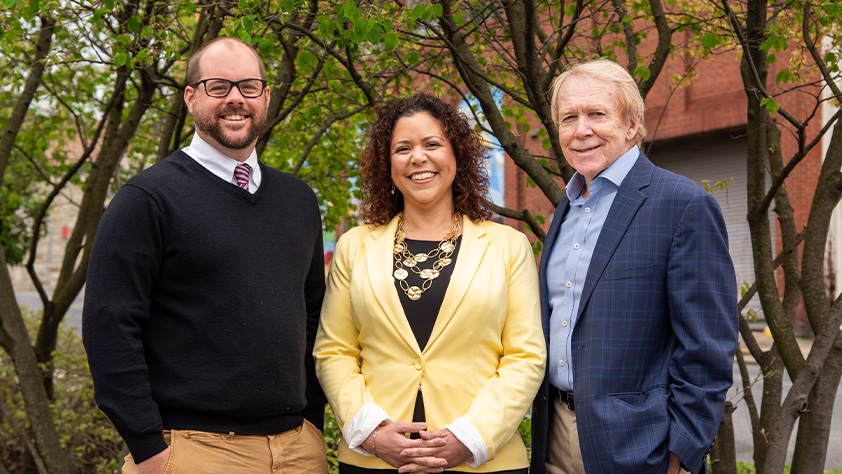
“Gaining insight into why it is important to have a County Health Department is the first step. Our goal is to educate the community on the benefits of a public health department. Fortunately, because of the Community General Hospital Healthcare Fund of Berks County Community Foundation, we were able to support a community conversation that our friends at Berks County Medical Society hosted. The conversation was held in September 2023 and gave residents a chance to ask questions about the four recommendations that resulted from the study. The study was released by Berks County Commissioners and conducted by Health Management Associates in March 2023. You can access the report by clicking here.”
Cindy Milian, Health & Human Services Program Officer
On November 8, Berks County Community Foundation held its Annual Meeting at the DoubleTree by Hilton hotel in Reading. More than 100 civic leaders attended the event, which included brief presentations by the Community Foundation’s program officers and an overview of the year by Kevin K. Murphy, foundation president.
“This year marked the culmination of our plan to increase our impact in Berks County by expanding the number of program officers working on specific causes,” Murphy said. “Our annual event gave us the opportunity to introduce these new faces to the community.”
The program officers oversee distributions from more than 346 charitable funds that were created by Berks County residents to support causes in the community that were important to them. In fiscal year 2023, those grants and scholarships totaled more than $6.2 million. That brings the total amount of grants and scholarships distributed since the Community Foundation’s founding in 1994 to over $101 million.
In addition to Murphy, who provided a recap of the West Reading Disaster Relief Fund, attendees heard from:
Vice President for Programs and Initiatives Monica Reyes about an effort underway with the Berks County Medical Society to share the results of a study about public health released by the Berks County Commissioners this year;
Health and Human Services Program Officer Cindy Milian about the work she oversees to support animal welfare and to assist families who have children with special needs;
Environment and Energy Program Officer Emily Smedley about grants that are increasing energy efficiency for local organizations and grants that are improving soil health by monitoring the flight patterns of birds of prey;
Lifelong Learning Program Officer Kim Sheffer about teacher mini-grants, which support innovative classroom projects across Berks County.
Details about each of these initiatives are available in the Community Foundation’s 2023 Annual Report.
In addition to learning about the work the Community Foundation is undertaking, attendees were invited to pick up a brush and add their touch to a Berks County mural, and to listen to a trio of local student musicians.
If you’d like to join the Community Foundation at future annual meetings, please send your name and email address to info@bccf.org and ask to be added to the invitation list. If you’d like to learn more about the Community Foundation, including how to start a charitable fund of your own, visit www.bccf.org.
At the community foundation, we help people in Berks County who want to do something charitable by distributing grants, scholarships, and other forms of support from funds they create based on the community’s needs. Our mission is to improve the quality of life for residents and to do that, we make a point of connecting with the community we serve.
One way we make those connections is to visit places where grants are distributed to see the impact they have on the community. We recently visited the Governor Mifflin area, which we manage several funds to support.
Our program team had an incredible day exploring the Governor Mifflin area. This visit took us to three unique and captivating locations: the Mifflin Community Library, Alvernia University, and the Allegheny Evangelical Lutheran Church. We also made some in-between stops, including John Updike’s childhood home, the U.S. Army Reserve Center, a much-needed stop for snacks at Tom Sturgis Pretzels, a quick trail walk at Berks Nature, Berks Military History Museum, and a visit with some farm animals at Swartz’s Roadside Stand.
Here’s a recap of this enriching experience:
Our first stop was the Mifflin Community Library, a true gem nestled in the heart of Governor Mifflin. As we entered this cozy library, we were immediately struck by the inviting atmosphere. We met Natasha Donaldson, Director of the library, and Colleen Stamm, Board Treasurer who were both friendly and helpful. The shelves were lined with a variety of books. The library’s serene reading nooks and vibrant children’s area made it a welcoming space for all ages. We discussed some of the programs offered at the library for the community. We shared information with Donaldson about the Russell L. Hiller Charitable Trust Fund.
“The funding helps us add more variety to our collection,” Donaldson said.
Judge Russell Hiller was a resident of Shillington, and in his will, he established a fund that distributes grants to help the Borough of Shillington, Shillington Borough Library, and Albright College, and provides scholarships to Governor Mifflin High School seniors. Additionally, the fund supports an annual competitive grant process for programs benefiting the residents of the Governor Mifflin School District.
Next on our itinerary was a meeting with Glynis Fitzgerald, President of Alvernia University. The campus was not only stunning but also vibrant, with students hustling to and from classes and enjoying the lovely surroundings. We explored the university’s modern facilities, from well-equipped classrooms to the state-of-the-art library. Many students who receive scholarships from the Community Foundation attend local colleges and universities like Alvernia.
We enjoyed lunch from Screpesi’s Sandwich Shop, where they know a thing or two about sandwiches. They have been serving Berks County since 1949. We took the sandwiches to Shillington Park and enjoyed the fall colors with a view of the Pagoda.
Our final stop took us to the Allegheny Evangelical Lutheran Church where we met with Kristen Kelly, Director for Children and Family Ministries. The church has beautiful architecture and serene surroundings that provide a sense of tranquility. Our tour gave us valuable insights into the rich history of the church and its role in the local community, which includes offering its space to community organizations and programming for residents.
The Home Health Care Foundation Fund supported two new automated external defibrillators (AEDs) for the church.
“Having the AED equipment provides us with peace of mind knowing it’s there in case there is an emergency,” Kelly said.
Throughout the day, we couldn’t help but appreciate the warm hospitality and genuine friendliness of the Governor Mifflin community. This tour was a perfect blend of intellectual exploration, natural beauty, and cultural heritage. Look for us on our next stop as we explore more of Berks County’s interesting organizations and history.
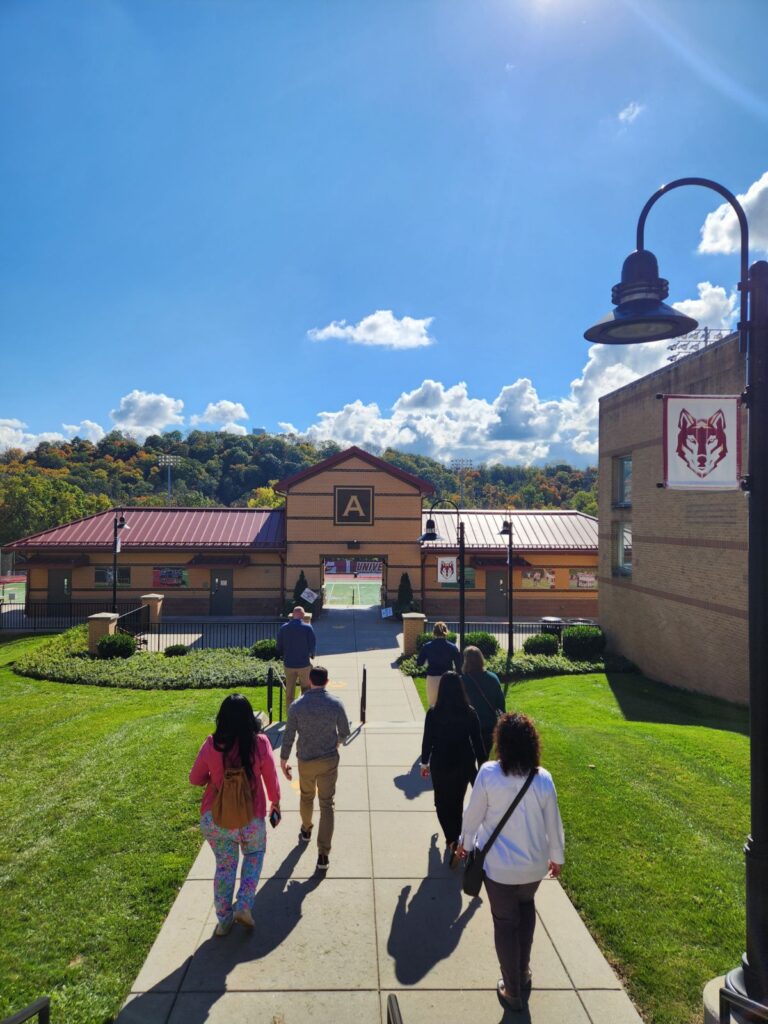
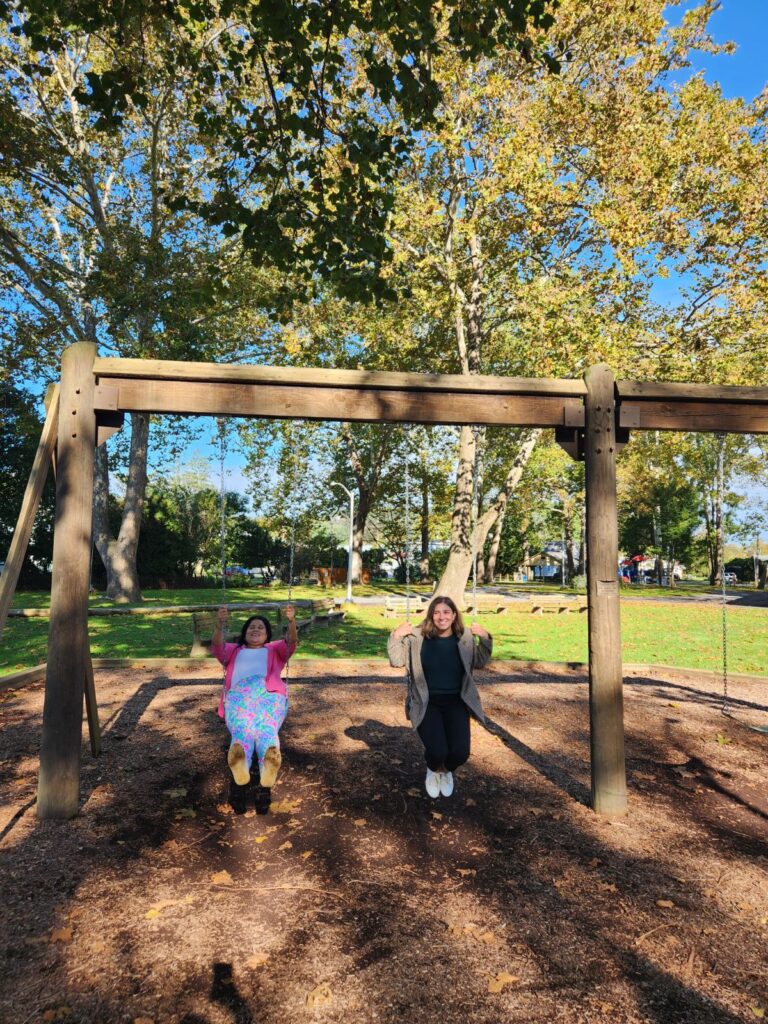
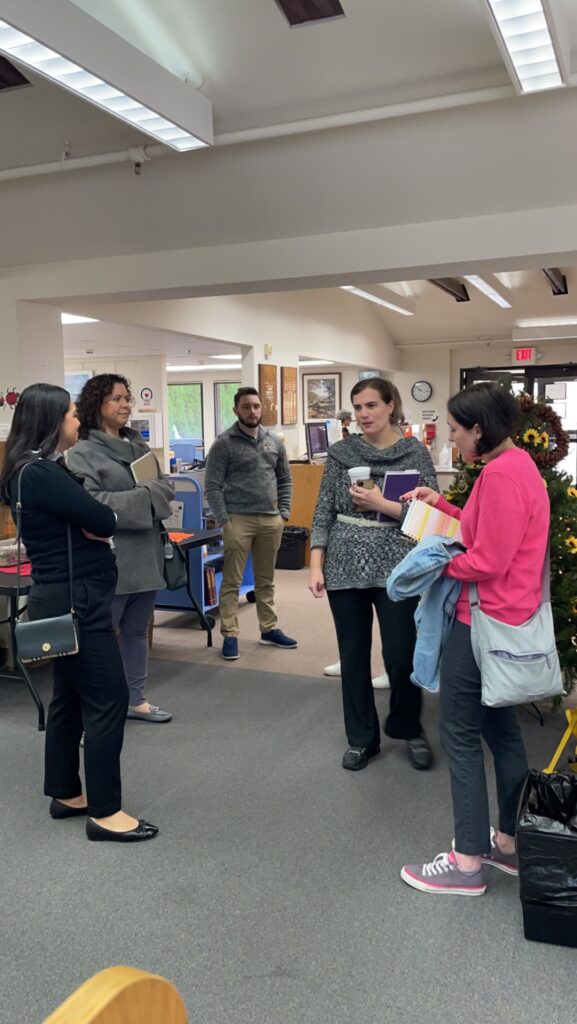
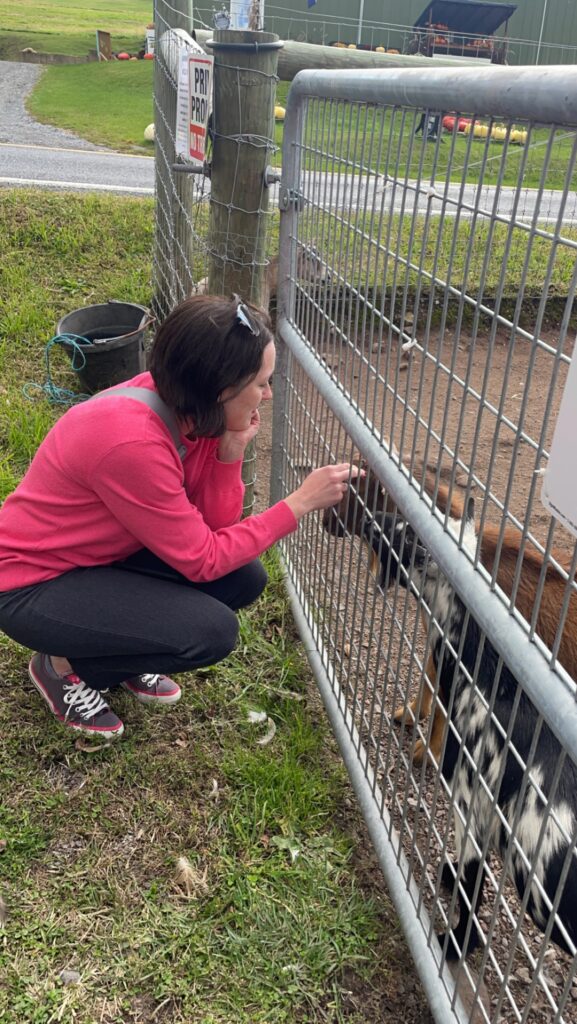


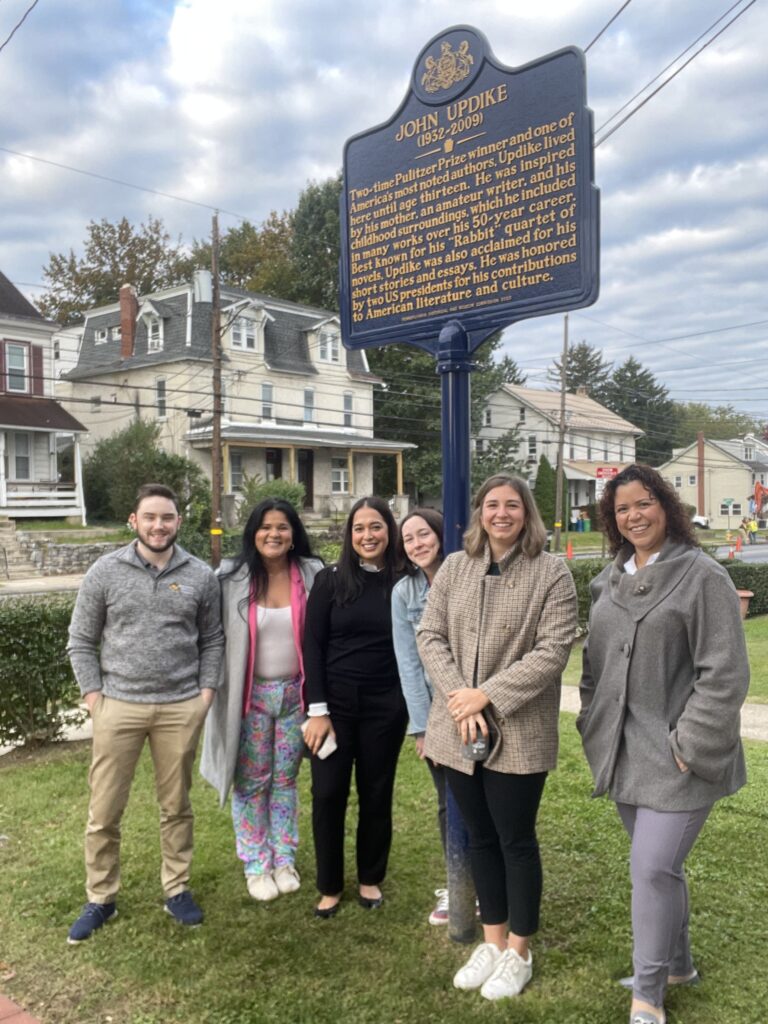
READING (December 1, 2022) — Berks County Community Foundation announced this month that one new employee has joined the organization. Erica Caceres is the Communication Manager.
As the Communication Manager, Caceres will tell the Community Foundation’s story through a variety of platforms, including the website. She will monitor advertisements and all types of media, assist other staff members with reports and presentations, and create story packages that put the written word, audio, photography, video, and other materials to their best use.
Before joining the Community Foundation, Caceres held a variety of marketing positions, including with Naylor Association Solutions, the Pennsylvania Apartment Association, and The Yocum Institute. She is a visionary storyteller with an eye for detail who is always ready to learn new things to ensure she is savvy with the latest trends.
Caceres is a graduate of Pennsylvania State University Berks Campus with a Bachelor of Arts in Communication Arts and Science degree and a minor in Professional Writing. In her college career, she was published twice in a local magazine, At Home in Berks.
Berks County Community Foundation is a nonprofit corporation serving as a civic leader for our region by developing, managing, and distributing charitable funds to improve the quality of life in Berks County, PA. More information is available at www.bccf.org.


